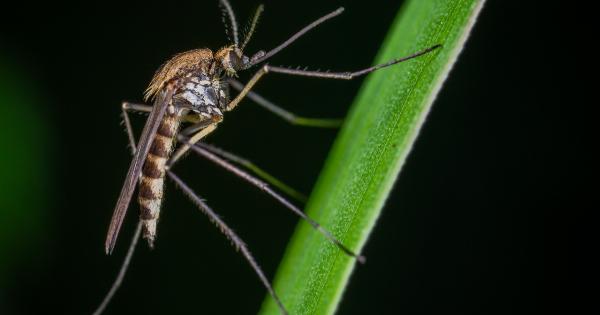The constant presence of mosquitoes can ruin a peaceful evening or a much-needed outdoor activity. Mosquito bites are not only itchy and irritating, but they can also transmit dangerous diseases such as malaria, dengue fever, and Zika virus.
While there are several ways to control mosquito populations, one effective and natural approach is to use anti-mosquito plants. In this guide, we will explore the top ten plants that repel mosquitoes and provide tips on how to grow and use them.
1. Citronella
Citronella is perhaps the most well-known plant when it comes to repelling mosquitoes. This aromatic grass emits a strong scent that masks other attractive odors to mosquitoes, making it difficult for them to locate their prey.
Citronella is commonly found in candles, insect sprays, and lotions. Planting citronella in your garden or keeping potted plants indoors can help keep mosquitoes away.
2. Lavender
Known for its calming fragrance, lavender is also a potent repellent against mosquitoes. Not only does it repel mosquitoes, but it also attracts beneficial pollinators, such as bees and butterflies.
In addition to planting lavender in your garden, you can also dry its flowers and use them in homemade potpourri or sachets to keep mosquitoes at bay.
3. Lemongrass
Lemongrass contains citronella, which is a natural mosquito repellent. It has a strong lemony scent that mosquitoes find unpleasant. You can plant lemongrass in your garden or use its essential oil to create your own mosquito repellent spray.
To deter mosquitoes indoors, consider keeping potted lemongrass near windows and entrances.
4. Basil
Basil is not only a popular culinary herb but also an effective mosquito deterrent. The strong aroma of basil leaves masks the scents that attract mosquitoes. Plant basil in pots near windows and entrances to prevent mosquitoes from entering your home.
Additionally, you can crush fresh basil leaves and apply them to your skin as a natural mosquito repellent.
5. Marigold
Marigolds are vibrant, low-maintenance flowers that add beauty to any garden while repelling mosquitoes. The distinct scent of marigolds is known to deter mosquitoes and many other insects.
Plant marigolds in sunny areas of your garden or use them as a border plant to keep mosquitoes away from your outdoor living spaces.
6. Catnip
Catnip is not only irresistible to cats but also highly effective in repelling mosquitoes. According to research, catnip is ten times more effective than DEET, a common ingredient found in commercial insect repellents.
Plant catnip in your garden, and if you have cats, they will be entertained by the plant while it keeps mosquitoes at bay.
7. Peppermint
The strong scent of peppermint is refreshing to humans but repulsive to mosquitoes. Plant peppermint in pots and place them strategically around your patio or entrances to keep mosquitoes from invading your outdoor spaces.
Peppermint can also be used to make your own mosquito repellent by crushing its leaves and mixing them with diluted vinegar or water.
8. Rosemary
Rosemary is a versatile herb known for its culinary uses and distinct aroma. This herb not only adds flavor to your meals but also acts as a natural mosquito repellent.
Grow rosemary in your garden or use its dried sprigs in outdoor fire pits or barbecues to repel mosquitoes. Additionally, burning rosemary leaves can create a fragrant smoke that keeps mosquitoes away.
9. Geranium
Geraniums are beautiful flowering plants that also have mosquito-repellent properties. Their strong fragrance masks the odors that attract mosquitoes while adding a splash of color to your garden.
Plant geraniums in pots or flower beds near entrances, windows, and outdoor sitting areas to create a barrier against mosquitoes.
10. Lemon Balm
Lemon balm, a member of the mint family, emits a strong lemony scent that naturally repels mosquitoes. Crush its leaves and rub them on your skin for a natural mosquito repellent.
You can also plant lemon balm in your garden or keep potted plants near windows and entrances to prevent mosquitoes from entering your home.
Growing and Utilizing Anti-Mosquito Plants
When it comes to growing anti-mosquito plants, it’s essential to consider their specific needs. Most of these plants thrive in well-draining soil and require regular watering.
However, some plants, such as lavender and rosemary, prefer drier conditions. Prioritize planting these plants in areas that receive adequate sunlight, as they generally require several hours of direct sunlight to grow and repel mosquitoes effectively.
Here are some additional tips for utilizing these plants to keep mosquitoes at bay:.
1. Create a mosquito-repelling garden by incorporating these plants along with other landscaping features such as fountains, bird baths, and rocks which reduce the standing water mosquitoes need to breed.
2. Harvest and dry the leaves, flowers, or stems of these plants to make potpourri, sachets, or homemade mosquito repellents.
3. Crush the leaves of these plants and rub them on your skin to enjoy their natural mosquito-repellent properties.
4. Consider planting these anti-mosquito plants near outdoor seating areas, windows, and entrances to create a natural barrier against mosquitoes.
5. Experiment with essential oils derived from these plants to create your own mosquito repellent sprays, lotions, or candles.
Conclusion
Using anti-mosquito plants provides a natural and effective way to control mosquito populations and reduce the risk of mosquito-borne diseases.
Incorporating these plants into your garden not only enhances its beauty but also creates a pleasant outdoor environment free from the nuisance of mosquitoes. Consider growing and utilizing these ten anti-mosquito plants to enjoy mosquito-free evenings and outdoor activities throughout the year.





























